Bitcoin Plugs Into Walla Walla
April 17, 2018
Over the past few years, Eastern Washington has become a hotspot of cryptocurrency mining. Cheap electricity provided by the Columbia dams and inexpensive real estate have lured entrepreneurs and techno-libertarians from all over the world to cities like The Dalles and Wenatchee, all in the hopes of making a quick buck. In light of this cash-driven craze, concerns about environmental sustainability, societal ethics and the local economy have been put on the backburner.
Walla Walla is hardly immune; in a public meeting this past Thursday, the Port of Walla Walla commissioners unanimously agreed to lease 10 acres of land (with an option to purchase) to Ant Creek LLC., a bitcoin mining company.
The decision did not, however, come smoothly. Nearly everyone who commented during the meeting objected to leasing the land for Bitcoin or cryptocurrency mining. Originally planned with an extra 30 acre purchase option, the deal was curtailed to 10 acres amid interventions from an impassioned audience.
Jeff Stearns, Director of Operations for Ant Creek, emphasized at the meeting that the company was not just a Bitcoin mining company, but is more broadly a blockchain and artificial intelligence business. The Ant Creek facility, however, will be primarily dedicated to cryptocurrency.
The Port of Walla Walla meeting on Thursday served as a springboard to bring concerns of blockchain and cryptocurrency to the foreground. Environmental sustainability, societal ethics and the local economy were all issues raised in the public forum that have extended into discussions beyond the Port meeting to Walla Walla and Whitman.
Ant Creek promises to thrust Walla Walla into the midst of a global conversation about the future of money and what role cryptocurrency might play. Andy Exley, Assistant Professor of Computer Science, does not view the influx of cryptocurrency mining as technology arriving in Eastern Washington, but as a global industry “coming to some smaller town, saying, ‘We’re going to set up a big factory!’”
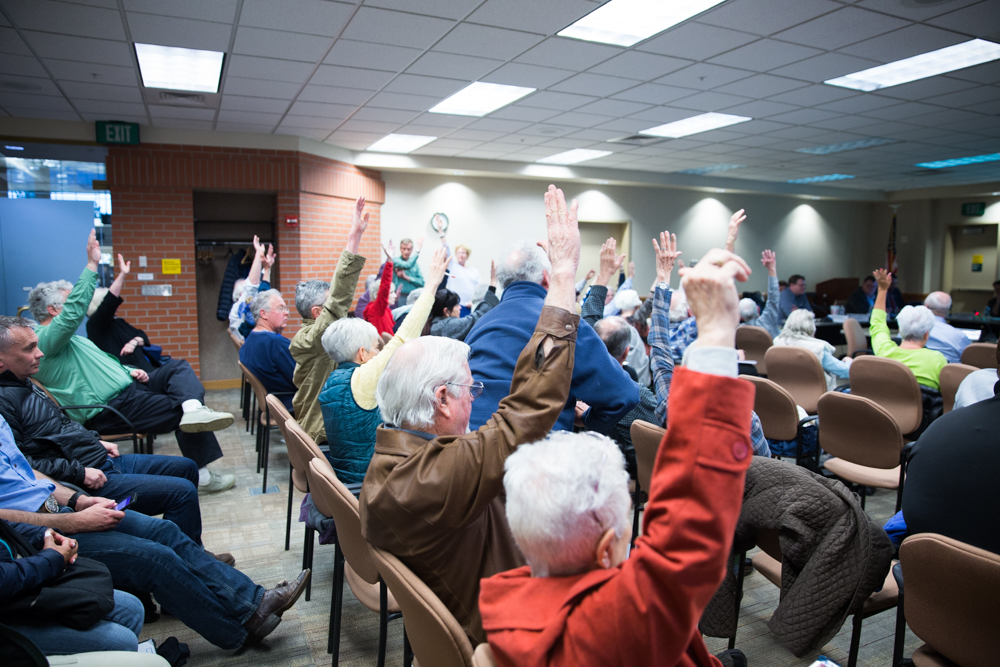
At the Port of Walla Walla meeting last Thursday, a community member solicited an informal poll for those gains leasing Walla Walla land to a Bitcoin company. Those with hands raised expressed their objection to the land lease, which was later passed unanimously by the Port.
But before any judgement either for or against crypto-capitalism in Walla Walla can commence, it is integral to understand what exactly the technology is, how it works and what risks it poses.
Bitcoin is a type of cryptocurrency. Bitcoin, and most other cryptocurrency, rely on blockchain technology to operate.
Blockchain is a technique that allows a network of computers to contribute to a distributed ledger. It’s a lot like a big Google spreadsheet that anyone can join, except for two main differences: there is no central Google-like database that stores the spreadsheet and it is only possible to add to the spreadsheet. Within a blockchain, the spreadsheet is not stored in one place, but instead is stored as an exact copy on each computer. The network of each copy of the spreadsheet is called a “distributed ledger.”
In order to make an addition to the distributed ledger, a computer must propose the change to all the computers as a “block.” A proposed block is simply a proposed entry in our big Google spreadsheet. Each computer on the network will verify this block as true if the block has the correct fingerprint, or “hash.” If there is a majority consensus throughout the network that this block is true, then it will be appended, or “chained,” to the distributed ledger.
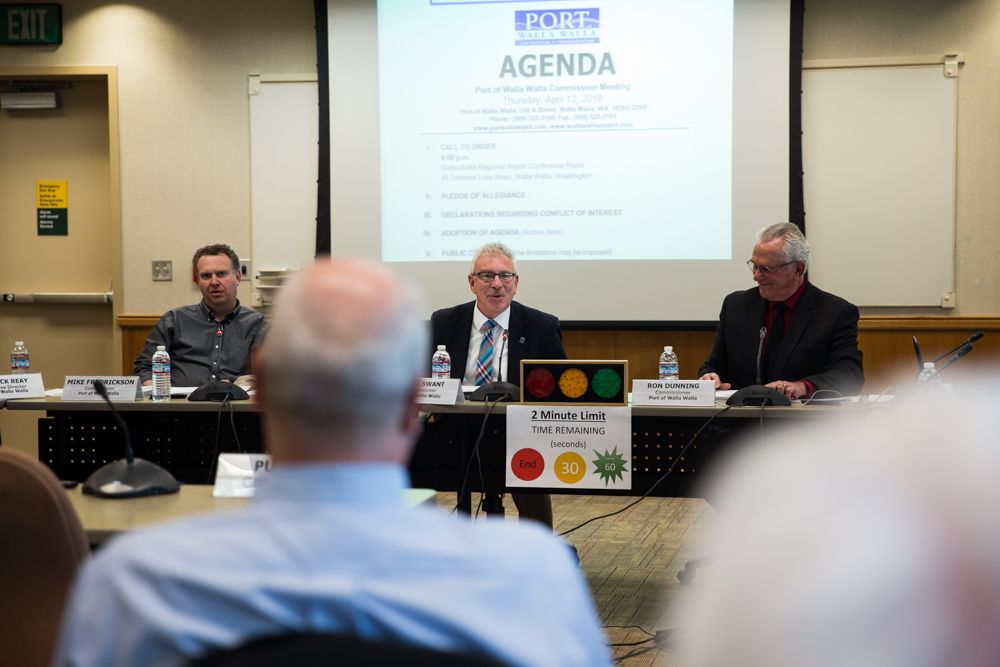
The three Port of Walla Walla commissioners, from left: Mike Fredrickson, Peter Swant and Ron Dunning. During the public comment portion of the meeting there was a two minute speaking limit due to the abnormally large turnout.
Cryptocurrency, like Bitcoin or Ethereum, uses the blockchain architecture. Bitcoin is different in that it provides a reward system for verifying blocks. Verifying and comparing each block’s unique fingerprint requires the computer to solve a long cryptographic math problem. This verification process is called “mining.” It takes time and a lot electricity to guess, through brute force, the math problem’s answer. As a reward for verifying the distributed ledger the computer’s account is rewarded some Bitcoin.
Ant Creek’s Sustainability
In an op-ed written to the Union-Bulletin, Bob Carson, Professor of Geology and Environmental Studies Emeritus at Whitman College, cites estimates that the Ant Creek facility will consume 30 megawatts of power, or the equivalent power usage of 24,000 homes.
Mike Fredrickson, a Walla Walla Port Commissioner, believes that for Ant Creek “to be environmentally sustainable, it’s incumbent on the individual company to purchase the electricity from a sustainable, renewable source like hydro-power, solar, geothermal or wind. I believe that it is for the users of the services to request/require the companies to pursue sustainable goals of the full triple bottom line.”
Columbia Rural Electric Association (CREA) would be the provider of electricity for Ant Creek. CREA’s CEO Les Teel, spoke at the Thursday Port meeting under a nondisclosure agreement between the Port and Ant Creek. He cited his confidence in CREA’s ability to provide sufficient power at no expense to current members.
However, the electricity usage by Ant Creek will not remain constant. Every day the amount of energy required to mine Bitcoin increases, thus increasing the potential use of coal or natural gas. The Bitcoin Energy Consumption Index projects that the annual electricity consumption of international bitcoin mining, as of now, is about 61 terawatt hours. The same index estimates that at its current rate, Bitcoin mining from around the world could consume more electricity annually than the entire country of Colombia.
Ant Creek’s power usage may have an impact on Whitman College as well.
While 86.75 percent of Columbia REA’s power is hydroelectric, Pacific Power, another major electricity provider to the county, is a blend of only 8.3 percent hydro, with 14.72 percent of energy coming from natural gas and 62.97 percent from coal. Whitman College utilizes Pacific Power for electricity, making the college’s usage similar to the provider’s blend — although the campus has been making strides in producing its own sustainable energy. Brandon Bishop, Campus Sustainability Coordinator, states that the “[Ant Creek] facility may impact the need for community investment into the regional energy grid … unfortunately this is likely to increase the need for energy from coal and natural gas.”
Others agree with Bishop’s concerns of a heavier reliance on coal: Barlow Corkrum, a long-time Walla Walla resident and currently serving on the City of Walla Walla Planning Commission, envisions that “if we waste massive amounts of energy creating bitcoins in Walla Walla, somewhere else, someone is breathing coal dust and polluting the air and water to heat their home or fill up their Tesla courtesy of a coal burning power plant.”
“Given Whitman’s focus on sustainability and commitment to reducing its carbon footprint, it’s difficult to reconcile those efforts with this highly energy-consumptive initiative that the Port of Walla Walla is bringing to our community,” writes Corkrum.
Unregulated Industry
Cryptocurrency was intended to decentralize power. Today, however, only 3.22 percent of Bitcoin addresses own 95.92 percent of the Bitcoin. The MIT Technology Review reports that “the top four Bitcoin-mining operations had more than 53 percent of the system’s average mining capacity, measured on a weekly basis.”
For students at Whitman wanting to mine Bitcoin individually, there is no economically feasible way to join in. Carl Felstiner ’19 says, “using your own computer to mine Bitcoin isn’t really a thing anymore since at this point you need to have dedicated hardware.” The most popular bitcoin-dedicated mining hardware are Antminers, manufactured by Bitmain, which cost around $1,000 depending on the setup.
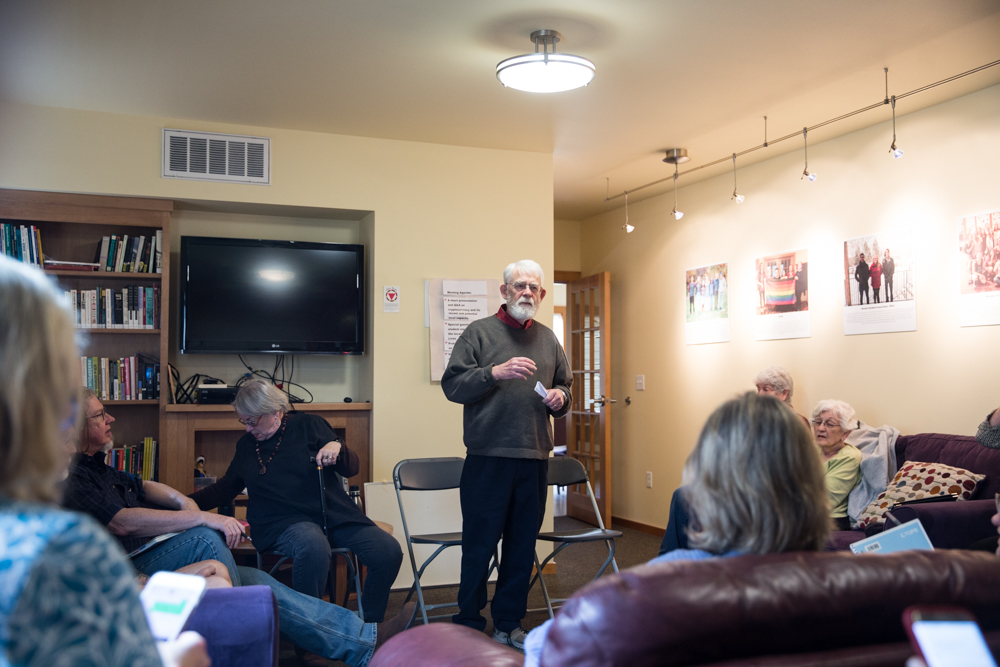
Norm Osterman ’65 speaks about Bitcoin at the Walla Walla Progressives meeting on Saturday, April 14. In the meeting the group re-capped the decision made by the Port of Walla Walla to allow a Bitcoin operation move into another county. The Walla Walla Progressives meet once a month, sometimes in the GAC, as was the case on Saturday.
Despite the steep financial overhead, the fervor surrounding Bitcoin remains. Justin Lincoln, Associate Professor of Art, considers that “there is the possibility that it would simply be a matter of a kind of a boom town, and when you think about mining and notions of gold, for example, certainly a few places flourished but the majority didn’t.”
At a Walla Walla Progressives meeting on April 14, Norm Osterman, Whitman graduate of ’65, echoed this sentiment, saying “it seems short sighted of us to have a bunch of people solving meaningless puzzles to create money out of nothing.”
With all the hype surrounding the rush for easy cash, Lincoln warns that we should not lose sight of what Bitcoin is often used for. “It’s very interesting that when people talk about bitcoin now they seem to disassociate it from its relationship with the dark web.” The dark web is infamously known to facilitate the transactions of illicit goods and services. Bitcoin, being semi-anonymous, secure and unregulated, is the dark web’s perfect currency.
A community member stated in a public comment during the Port meeting, that Bitcoin “transactions are so secure that governments can’t see it. The only ones [who can see it are] drug dealers, human traffickers, terrorists. That’s where the real value of Bitcoin is; it is not used in legitimate business.”
That is not to say there are not any legitimate practices with crypto or blockchain. Bail Bloc is an app that uses the background processing power of one’s personal computer to lightly mine cryptocurrency. One-hundred percent of the cryptocurrency are exchanged for dollars which are then donated to the Bronx Freedom Fund, a fund dedicated to paying bail for people accused of misdemeanors who otherwise wouldn’t be able to afford it.
The Whitman Connection
Ant Creek LLC., is based in Tumwater, Wash. According to the Department of Revenue, Ant Creek is registered to Jihan Wu. Wu is the co-founder and co-CEO of China-based company Bitmain, the largest bitcoin equipment manufacturer in the world as well as one of the largest bitcoin mining operations globally.
Stearns, Director of Operations at Ant Creek, stressed in his meeting presentation that the company will be making contributions to the local community: they plan to hire 25-35 fully benefited positions, including investments in road and site construction.
In towns like Wenatchee and The Dalles, where mining has already moved in, there is ambiguity to its local benefit. “If you look at other communities that have allowed the development of server farms similar to those utilized in bitcoin mining they have seen some benefits; but often had low impact on regional labor markets,” said Brandon Bishop.
In his presentation Stearns also briefly focused on the reaction between the Port and local colleges, writing in his slideshow that he was “encouraged by the Port of Walla Walla’s desire to bring in ‘software/technology-based businesses’, [and] local university talent pool.”
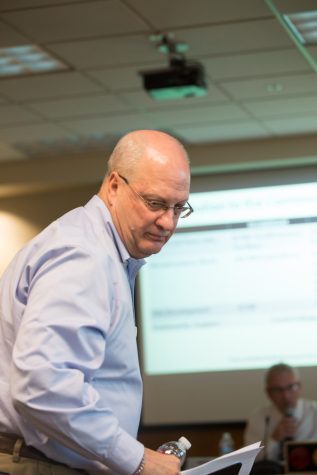
Jeff Steams, the Director of Operations at Ant Creek LLC., gave a presentation at the Port meeting on Thursday. He highlighted the company’s role as more that just a cryptocurrency buisness.
The Port of Walla Walla is a municipal corporation that is, according to its mission statement, “responsible for fostering economic development throughout Walla Walla County.” They take in approximately $2 million dollars per year from property and sales tax. Recently, the Port donated $25,000 to the Computer Science at Whitman club to help furnish a hackerspace in the basement of the Technology Services building.
Fredrickson, one the Port commissioners, is a proponent of the Computer Science department at Whitman. “[It] is a great place to further study any number of ideas including blockchain. The grant from the Port to Whitman was to assist in starting a coding space for college students in the valley with the hope that it is a catalyst for the next great startup, supporting the college as well as enhance the economic vitality of Walla Walla County.”
Some are more skeptical of the adoption of such an industry. At the Port meeting, there was a great deal of confusion as to not only what Ant Creek was going to do with their facility, but what exactly bitcoin or blockchain even were. “It points out to me that that Mr. Fredrickson, as the one who’s studied the most and was the most vocal, really didn’t know what they were going to put in there. This shows and appalling lack of due diligence,” said Osterman.
Fredrickson, when asked if he thought Ant Creek would ever pivot from cryptocurrency mining, replied “AntCreek said in the meeting that it is primarily a mining operation. I believe it will change in the future, as more companies utilize the blockchain technology and it becomes as ubiquitous as the internet is today.”

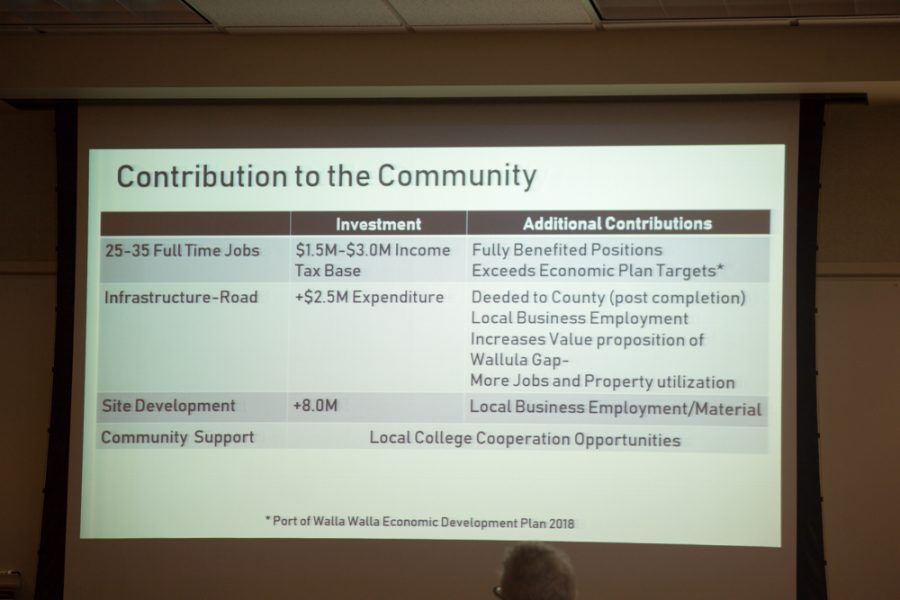




Henry Hubbard • Jul 22, 2019 at 2:01 pm
Great article, your explanation of bitcoin and blockchain was so good! That being said what really do we have to fear here? It’s just (little) more data, more electronics and more of the inevitable future coming our way. Have nothing to fear my fellow onion heads the future is already here..